
Thank you for purchasing this HiB product.
Please read through these instructions carefully and refer back to them during installation to ensure that
your product is fitted safely and that it retains its high quality finish.
Please retain this leaflet for future reference.
Before drilling, ensure there are no hidden cables or pipes in the wall.
Please Note these products must be installed with a minimum distance
of 150mm between the infra-red sensor switch and any surface or object
to ensure correct operation of the sensor.
LED Illuminated Cabinets
FI #02 001 R211012 Ver No. 1.1 Jan 2016
Flare
Art No. 44900
Flux
Art No. 44600
Spectrum
Art No. 44700
Min. 150mm

2
Fixing Preparation (Fig A)
Fixing Brackets (Fig B) Hanger Adjustment (Fig C)
Wall Hung Installation
1. Position the cabinet in a suitable location
(according to the zonal diagram (Fig 1) on
the back page) ensuring that the mains
supply cable is within reach of the cable
connection point of the cabinet. Carefully
mark the desired position of the cabinet
using a so pencil, ensuring it is level.
2. Remove the cabinet from the wall and using
a spirit level, mark a horizontal line below
the pencil mark, taking into account the
location of the mounting points (Fig. A).
Place brackets on the pencil line paying
attention to the distance between the
hangers on the cabinet. Carefully mark the
position of the holes using a so pencil.
(Fig. B).
3. Before drilling, ensure there are no hidden
cables of pipes behind the mounting
points. Using a suitable drill bit, drill holes
in the marked positions to a suitable depth.
4. Insert wall plugs level with the surface of the
wall. If fitting to a tiled surface, wall plugs
should be inserted below the tile surface to
avoid cracking. NB. For plasterboard walls,
specialist fixings should be purchased from
any DIY or hardware store.
5. Fix the brackets to the wall using the screws
provided.
6. Carefully remove the small screws along the
top front edge of the cabinet to gain access
to the internal panel(s). (Fig. C) Keep screws
in a safe place.
7. Temporarily hang the cabinet ensuring the
claws on the hangers are securely located
on the wall brackets. Using a spirit level
adjust the cabinet via the screws on the
hangers. (Fig. C).
8. Mark the position of the internal fixing hole
Please Note You may need to remove the door(s) to aid installation. This can be done by unclipping the
hinges. (There is a release catch at the back of the hinge). DO NOT FIT SHELVES AT THIS STAGE.
Extra care must be taken when handling cabinets with mirrored sides or diffusers, especially when
picking up and putting down the cabinet - do not pick up the cabinet by the diffusers.

hib.co.uk 3
How to isolate the sensor so you can
switch ON & OFF with a mains switch.
Rewire the cabinet as shown in the diagram
above. HiB recommends that all electrical
bathroom products should only be fitted by a
suitably qualified, Part P registered electrician.
For further assistance on isolating the sensor
please contact us.
Tel: 020 8441 0352 Email: sales@hib.co.uk
and remove the cabinet. Using a suitable
drill bit, drill a hole and insert a wall plug as
per stage 4.
9. Connect the cable at the rear of the cabinet
to the mains supply cable using a suitable
terminal block (not supplied) according
to the wiring diagram (Fig. 2) on the back
page.
10. Rehang the cabinet in position, tighten the
screws on the hangers (Fig. C) and secure
the base of the cabinet with the supplied
screw and screw cap.
11. Once fully secure, close the internal panel(s)
using the screws removed at stage 6.
12. Fit shelves in desired positions using metal
shelf supports.
13. Reattach the door(s) ensuring the hinges
fully locate and click back into position.
14. If necessary, the hinges can be adjusted in
order to reposition the door(s) (Fig.D).
15. Switch the mains supply back on.
Door Adjustment (Fig D)
Operating Instructions
To turn illumination on or off, wave your hand
under the sensor switch located at the bottom
of the cabinet. Charger socket is suitable
for charging and powering electric razors,
trimmers and toothbrushes.
NB. On first use of the charger socket,
inserting the shaver plug may prove to be stiff.
Reasonable force may be required to fully insert
the plug. Make sure that the cabinet is held
firmly so that it is not pushed off the wall. Aer a
few uses, stiffness will ease and the socket will
function as normal.

This product is suitable for installation in zones: 2 & Outside Zone
All installations must comply with guidelines which are based on a zonal concept. The diagram above
illustrates this concept and must be followed to ensure the safe installation of electrical appliances in the
bathroom. These regulations apply to domestic installations only. Installations must be made in accordance
with the current IEE wiring regulations and relevant building regulations. HiB recommends that all electrical
bathroom products should only be fitted by a suitably qualified, Part P registered electrician.
©HiB Copyright: No part of this document may be reprinted or duplicated without HiB consent. All sizes and measurements are approximate, but we do try and
make sure they are as accurate as possible. In the interest of continuous product development, HiB reserves the right to alter specifications as necessary. E & OE.
T: +44 (0)20 8441 0352 F: +44 (0)20 8441 0219 E: [email protected].uk hib.co.uk
Building 3, North London Business Park, Oakleigh Road South, New Southgate, London. N11 1GN
(Fig 1)
Wiring Diagram (Fig 2)
live
earth
neutral
MAINS SUPP LYLUMINAIRE
Live supply can be Red or B rown
Earth supply is Gr een and Yellow
Neutral supply can be Blue or Black
Live is B rown
Earth is Gr een and Yellow
Neutral is Blu e
Electrical Safety Information
HiB recommends that all electrical bathroom products should only be fitted by a suitably qualified,
Part P registered electrician in accordance with current IEE regulations. Ensure mains power supply is
switched off before starting installation. Before drilling, ensure there are no hidden cables or pipes in
the wall.
Care Instructions
Do not use abrasives or solvents when cleaning this product.
Wipe off all water spillages as soon as possible using a so, damp cloth.
Aercare Service
In the unlikely event that this product should fail please contact HiB customer services, contact details
shown below.
Electrical Information
This product contains a light source of
energy efficiency class E
WEEE compliance
Must not be mixed with
general household waste
-
 1
1
-
 2
2
-
 3
3
-
 4
4
HiB Spectrum Fitting Instructions
- Type
- Fitting Instructions
Ask a question and I''ll find the answer in the document
Finding information in a document is now easier with AI
Related papers
-
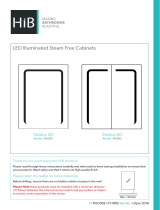 HiB Stratus 50 Fitting Instructions
HiB Stratus 50 Fitting Instructions
-
 HiB Edge Fitting Instructions
HiB Edge Fitting Instructions
-
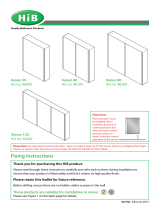 HiB Xenon 50 Installation Leaflet
HiB Xenon 50 Installation Leaflet
-
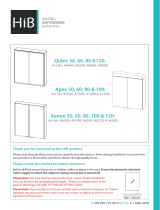 HiB Xenon Fitting Instructions
HiB Xenon Fitting Instructions
-
HiB 54500 User manual
-
 HiB Beam Fitting Instructions
HiB Beam Fitting Instructions
-
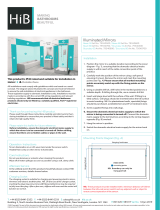 HiB 79550500 Beam 50 LED Ambient Rectangular Mirror User manual
HiB 79550500 Beam 50 LED Ambient Rectangular Mirror User manual
-
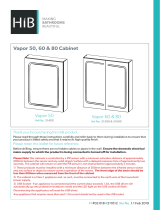 HiB Vapor Fitting Instructions
HiB Vapor Fitting Instructions
-
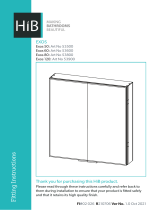 HiB Exos Fitting Instructions
HiB Exos Fitting Instructions
-
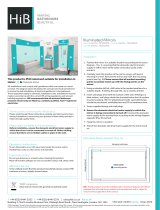 HiB 79560500 User manual
HiB 79560500 User manual












